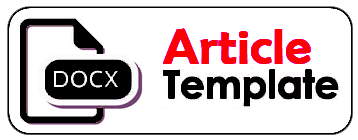Publications Ethics
The publication of an article in the Majalah Ilmiah Cahaya Ilmu is an essential building block in the development of a coherent and respected network of knowledge. It is a direct reflection of the quality of the work of the authors and the institutions that support them. It is therefore important to agree upon standards of expected ethical behavior for all parties involved in the act of publishing: the authors, the journal editors, the best-selling partners, the publisher and the public. We are committed to ensuring that advertising, reprint, or other commercial revenue does not influence editorial decisions. In addition, the Majalah Ilmiah Cahaya Ilmu and the Editorial Board will assist in communications with other journals and/or publishers where this is useful and necessary.
Publication Decisions
The editor of the Majalah Ilmiah Cahaya Ilmu is responsible for deciding which of the articles submitted to the journal should be published. The validation of the work and its importance to researchers and readers must always drive the decision. The editors may be guided by the policies of the journal's editorial board and constrained by such legal requirements as shall then be in force regarding libel, copyright infringement and plagiarism. The editors may consult with other editors or reviewers in making this decision.
Fairness Aspect
Editors evaluate manuscripts for their intellectual content at all times, regardless of race, gender, sexual orientation, religious belief, ethnic origin, national origin, or political philosophy of the authors.
Confidentiality
The editor and any editorial staff must not disclose any information about a submitted manuscript to anyone other than the corresponding author, reviewers, potential reviewers, other appropriate editorial advisers, and the publisher, as appropriate.
Disclosure and conflicts of interest
Unpublished materials disclosed in a submitted manuscript must not be used in an editor's own research without the express written consent of the author.
Duties of the reviewer:
Contribution to Editorial Decisions
Reviewers assist the editor in making editorial decisions and through the editor assist the author in improving the paper.
Promptness
Any selected reviewer who feels unqualified or uninterested in reviewing the manuscript and/or who feels that the reviewer is unable to complete the research should notify the editor immediately and withdraw from the review process.
Confidentiality
Any manuscripts received for review must be treated as confidential documents. They must not be distributed to or discussed with others except as authorized by the editor.
Standards of Objectivity
Reviews should be objective. Personal criticism of the author is inappropriate. Reviewers should express their views clearly with supporting arguments.
Acknowledgement of Sources
Reviewers should identify relevant published work that has not been cited by the authors. Any statement that an observation, derivation, or argument had been previously made should be accompanied by the relevant citation. A reviewer should also disclose to the editor any substantial similarity or overlap between the manuscript under consideration and any other published paper of which they have personal knowledge.
Disclosure and Conflict of Interest
Information or ideas obtained through peer review must be kept confidential and not used for personal advantage. Reviewers should not consider manuscripts in which they have conflicts of interest resulting from competitive, collaborative, or other relationships or connections with any of the authors, companies, or agencies connected to the papers.
Duties of Authors:
Reporting Standards
Authors of reports of original research should present an accurate account of the work performed as well as an objective discussion of its significance. Underlying data should be represented accurately in the manuscript. The manuscript should contain sufficient detail and references to permit others to replicate the work. Knowingly reporting fraud or providing inaccurate information is unethical and unacceptable behavior.
Data Access and Retention
Authors are asked to provide the raw data in connection with their manuscript for editorial use and should be prepared to provide public access to such data (as required by the journal), if practicable, and should retain such data after publication.
Originality and plagiarism
Authors should ensure that they have written entirely original works, and if the author has used







